The key with buying stainless cookware is that you want to make sure it is clad. Let me back up a little.
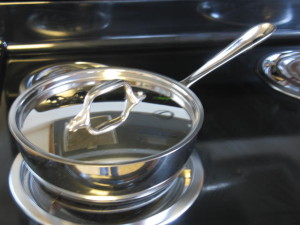
All stainless cookware isn’t actually just stainless steel. That would take forever to heat up. So there is generally at least one layer of a different metal between the layers of stainless that is a better conductor of heat, typically aluminum. Aluminum detractors, never fear—the aluminum cannot get out unless you sawed these things in half, no matter what style of pan it is. (Unless it’s an all-aluminum pan [not cast aluminum, not anodized, straight up aluminum!] with no stainless, which you’d maybe find in a camping store. Even then only really acidic foods like tomatoes should scare you.)
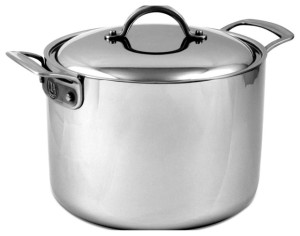
What you will see in less expensive cookware, or very large pots (anything over 16 quarts, to be exact), is a disc that has been attached to the bottom of the pan. Some people think that the thicker this disc, the better the pan will distribute heat, but that isn’t exactly true. To get a more even distribution of heat, you want something called clad cookware.
What clad means is that the metals are actually laid together like a sandwich, then bent into the shape of a pan, meaning the conductive interior is all over the inside of your pan. See the awesome drawing I made below:
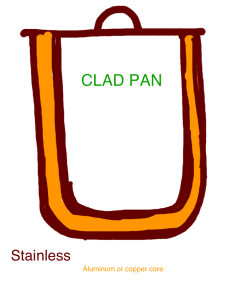
Some brands will have multiple interior layers with various metals inside. The best conductor is copper, which is pretty expensive. [Note to folks with glass stovetops—the majority of glass stovetops take a really long time to heat up, so getting copper cookware won’t help alleviate this issue much, unfortunately.]
The most well known clad cookware is All-Clad, a lot of which is still made in the USA. They have several lines and are the original clad cookware manufacturer. It’s hard to clad anything larger than a 16 qt. but I think the even heat distribution issue is far more important for frying pans and saucepans, anyway. If buying something made in the USA is your priority, please note that not all All-Clad items are made at home anymore, including all lids and accessories. (Note that accessories come in black boxes, making it easier to tell it’s made in China.)
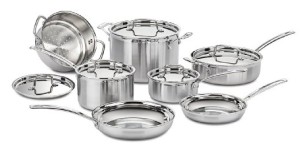
Cuisinart’s Multi-Clad line is consistently top-rated as a great alternative to All-Clad, and I have heard this repeatedly from its users. All-Clad is five-layers of steel (they have other lines now, but nothing is less than five) around an aluminum core, and Cuisinart’s Multi-Clad is three layers. Both clean very nicely. Moving in the opposite direction price-wise, Viking cookware is seven layers of steel around an aluminum core. (Viking no longer produces cookware or appliances.)
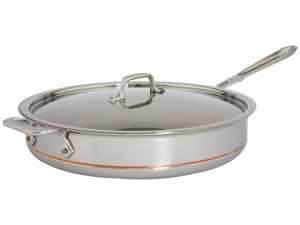
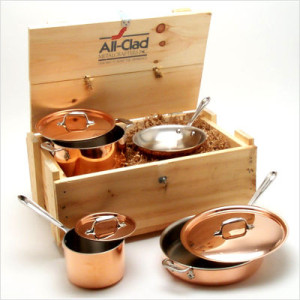
If you’re looking for something with a copper core, All-Clad’s copper core line has a stainless exterior. This is a tad on the expensive side, but beautiful cookware. (Do not confuse the copper-core with the copper-exterior line! The copper cookware has an aluminum core, just like the stainless lines do. Apparently they don’t manufacture the copper line anymore, as it’s not listed on their website.) CIA cookware is relatively new to the game, lowering their price point in order to compete, and it has seven-layers of steel around a copper core for about half the price of All-Clad. CIA stands for Culinary Institute of America, which is the only school that can designate someone a Master Chef. Everything in their product line came from ideas vetted by master chefs to make sense in the kitchen.
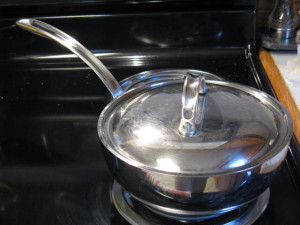
One thing I have discovered I dislike about stainless cookware is the rivets. Most cookware have rivets so when I do make a mess in the stainless pieces I own, the rivets drive me nuts. On the pro-side, you can use metal utensils, which I think are just great. I’d never been able to use them my whole life until now.
Click here to return to “Buying Cookware” to compare to other types of cookware!
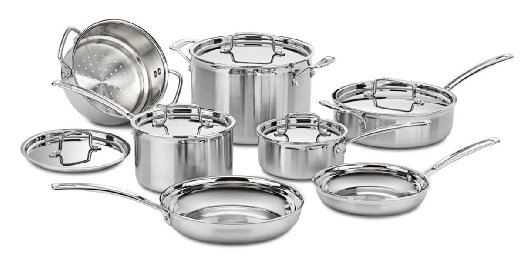
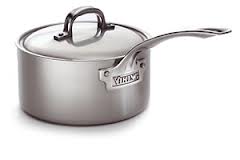
HSN had a huge sale today. I ordered an 8in tri-clad stainless steel fry pan by Bon Appetit! It was 60% off and only $1.95 for shipping – I had to go for it! Will get back to you after it gets here!
Sounds like a great buy! 🙂
So my very first piece of tri-clad by bon appetit is here! Do I have to do anything to it before I use it? Its so pretty and shiny – I don’t want to ruin it.
Well, remember that it won’t stay pretty and shiny, but you can keep it mostly pretty. 😉
Read the instructions, wash it before using it first. Don’t use high heat. Use lots of delicious butter or healthy oils. Don’t be afraid!! You could do the egg test–put lots of butter in the pan and make sure you move the butter back under the egg with your spatula once you crack the egg into the buttery pan. Even if you don’t use it to make eggs again, it will prove to you that it’s a good pan!
Do you have a metal spatula for camping? Bust it out and feel how great it is to be able to cook with a metal utensil! It feels awkward at first!
Enjoy!